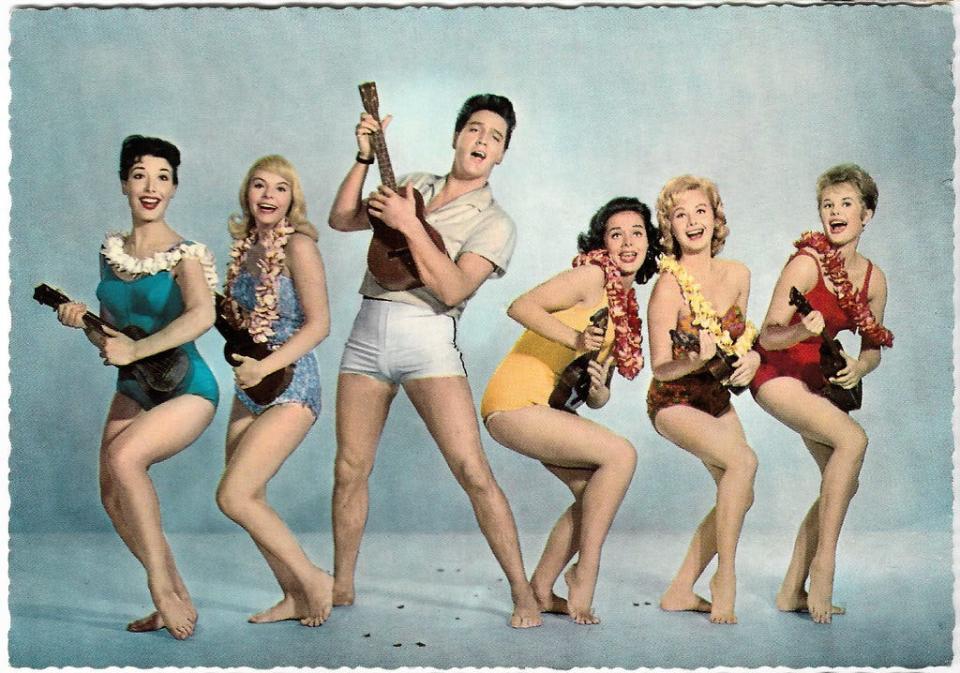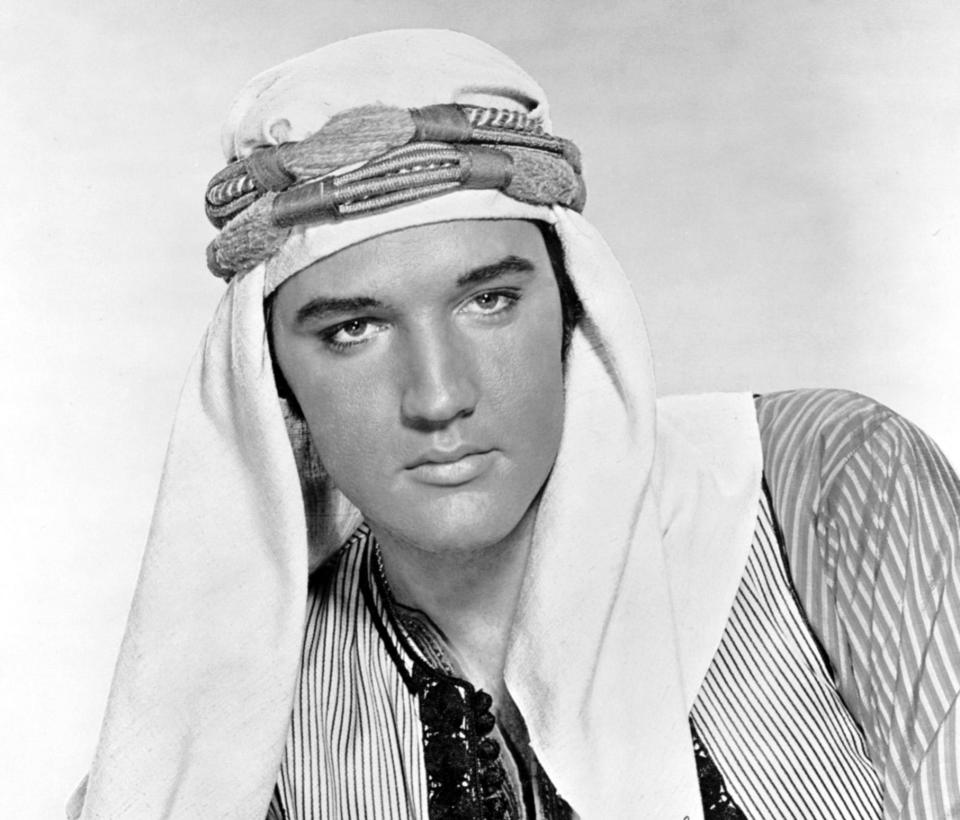The 10 best (and the absolute worst) Elvis movies, ranked
The story of Elvis Presley's film career is one of wasted potential. Too many of the 31 movies he shot from 1956 to 1969 were money-making hack jobs, their scripts existing to do little more than fill time between musical numbers. Indeed, in Baz Luhrmann's new "Elvis" biopic, the King of Rock 'n' Roll's entire Hollywood career is reduced to a flashy montage.
But for the Elvis fan, part of the appeal lies in watching his instinctive onscreen ability and thinking about what might have been: imagining Presley with Robert Mitchum in "Thunder Road" or opposite Barbra Streisand in "A Star Is Born," two roles he could have had.
To mark the 45th anniversary of Elvis' death (Aug. 16, 1977),USA TODAY picks 10 (well, OK, 11) favorites from the Presley canon, plus a few to avoid.
Fact checking the new 'Elvis movie: Did he really fire Colonel Tom Parker onstage in Las Vegas?
10. 'Change of Habit' (1969)
The singer's final feature isn't a great film, by any stretch of the imagination. It's barely a decent one. But it goes a long way on its concept alone: Presley plays an inner-city doctor whose love interest is Mary Tyler Moore – as a nun. What's not to love there, right? "Change of Habit" is sort of the film equivalent of "In the Ghetto," a heavy-handed attempt at cultural relevance. (At one point, his character says, "I get the feeling there's a message here.") Look for the great Darlene Love in an uncredited role as a backup singer. Ed Asner, who would later play Lou Grant to Moore's Mary Richards, is in it, too, though he and Moore don't have any scenes together.
'Where has this been hiding?': Tom Hanks changed his mind about his favorite Elvis song

(tie) 'Blue Hawaii' (1961)
In a perfect world, "Blue Hawaii" would have been the worst movie Presley ever made. Instead, it's solidly in the top third. For all practical purposes, it's a travelogue with a nice soundtrack, including "Can't Help Falling in Love." That would have been just fine, if it hadn't been so successful that the moviemakers and Presley's manager, Colonel Tom Parker, used it as the template for nearly every Presley film that followed, with ever less impressive results.
Review: Austin Butler rules as the King, but Baz Luhrmann's 'Elvis' is an unchained mess of a movie
9. 'Love Me Tender' (1956)
Presley's first film appearance might rank higher on this list if he had starred in it – but he had only a supporting role in what Variety called "a minor-league oater," the only time he'd be in that position. Presley clearly was inserted in the film, set during the 1860s, to capitalize on his popularity. Theaters hoped to pull young viewers away from the TVs that were popping up in households across the nation, and it worked. It's charming to watch a greenhorn Presley enthusiastically acting opposite more seasoned veterans who knew they weren't in a particularly good picture.
'I couldn't be an imposter': How Austin Butler vanished into the role of Elvis Presley
8. 'Kid Galahad' (1962)
Take Presley out of the equation, and "Kid Galahad" is a run-of-the-mill boxing picture. In fact, that's just what it was the first time around, in 1937, when Michael Curtiz (who'd go on to direct Elvis in "King Creole") made it with Edward G. Robinson, Bette Davis and Humphrey Bogart. Presley, whose weight had ballooned, made for a doughy but hard-punching ingénue who gets caught up in a fight-fixing scheme. At least he had a decent supporting cast, which included Charles Bronson.
We didn't have the empathy to talk about Elvis' health problems then. What about now?
7. 'Follow That Dream' (1962)
After "Blue Hawaii," Presley headed to Florida, where he played a beach squatter named Toby Kwimper that New York Times film critic Bosley Crowther described as "a combination Sir Galahad and Li'l Abner." Presley seems engaged here, and displays a nice comic touch. Bumped up one spot on this list for helping set the life's course of an 11-year-old Tom Petty, who visited the set.
Appropriation or appreciation? How 'Elvis' highlights his complicated history with Black music

6. 'Viva Las Vegas' (1964)
Flashy, gaudy, trashy and thin on story, just like the Vegas myth. There's not much of a script, but swimming instructor Ann-Margret looks hot, and so do Presley's cars. "As pleasant and unimportant as a banana split," said The New York Times, and that's just about right. The film that foreshadowed Presley's future boasts some great tunes, though, and one of the most perfect sequences in any of his films – a dreamscape for the jazz-infused "I Need Somebody to Lean On" in which Presley has the beatific look on his face that he usually reserved for gospel tunes.
5. 'Wild in the Country' (1961)
Perhaps Presley's most ambitious dramatic film, "Wild in the Country" was ultimately undone by the competing priorities of those making it. The script, penned by playwright Clifford Odets, called for Presley to play a callow country boy loaded with literary talent. A cast that included Hope Lange and Tuesday Weld and an attempt at topical relevance made "Wild" better than the average Presley film, though Variety found it "wobbly and artificial." Smash "Blue Hawaii" followed, firmly establishing the kind of movies he'd make for the rest of his career.
4. 'Flaming Star' (1960)
After the genial but fatuous "G.I. Blues," 20th Century Fox tried to re-establish Presley's dramatic credentials, casting him in this Western as Pacer Burton, a half-breed caught in a culture war and land dispute. Marlon Brando and Frank Sinatra had both been associated with the project, co-written by Nunnally Johnson, who previously had written and directed "The Man in the Gray Flannel Suit" and "The Three Faces of Eve." The role demanded more of Presley than most of his movies, and he found genuine chemistry with the great Dolores del Rio. The New York Times called "Flaming Star" "an unpretentious but sturdy Western that takes the time, the place and the people seriously." Theater owners called it a flop.
3. 'Loving You' (1957)
Elvis' first starring vehicle was a fairly conventional showbiz musical, with country boy Deke Rivers rising to fame then dealing with its pitfalls. In other words, a story not unlike Presley's own. By 1950s teen rock-film standards, "Loving You" is credible, with plenty of energy and a strong soundtrack including the No. 1 hit "Teddy Bear," "Mean Woman Blues" and "(Let's Have A) Party." Variety pronounced that Presley "shows improvement as an actor" and that the film "exposes the singer to the kind of thing he does best." You know, like singing and hip-swiveling. Too bad Presley and his handlers would soon learn they could still make money with less effort and attention to quality.
2. 'Jailhouse Rock' (1957)
The singer's third film received mixed reviews at the time, with several high-profile publications panning it vociferously. British magazine The Spectator, for instance, called it "dangerously near being repulsive." They were, of course, wrong. This story of an ex-con pop star has held up better than almost any of Presley's other movies. The plot offers parallels to Presley's own story, particularly when he gets involved with a manipulative manager. It's also got first-rate songs from the team of Jerry Leiber and Mike Stoller and the title song's great dance sequence, arguably the most thrilling thing Presley ever committed to film.
1. 'King Creole' (1958)
Presley's best picture shows what surrounding him with talent could do for him. Director Michael Curtiz ("Casablanca," "Mildred Pierce," "Angels With Dirty Faces") brings a noir-ish black-and-white style to the story of a young singer who falls in with organized crime in New Orleans. Initially written with James Dean in mind, "King Creole" was based on Harold Robbins' "A Stone for Danny Fisher," and co-stars Carolyn Jones (who later found fame as Morticia Addams on "The Addams Family") and Walter Matthau. Even The New York Times, which usually mocked Presley's films, found itself surprised by his performance: "Cut my legs off and call me Shorty!" Howard Thompson's review began. "Elvis Presley can act."
Elvis Presley made plenty of bad films, but these were the lamest
'Paradise, Hawaiian Style' (1966)
The third and most unwatchable of Presley's Hawaii films. Remember how engaged and excited he looked in "King Creole" and "Jailhouse Rock"? Yeah, that guy's gone.
'Easy Come, Easy Go' (1967)
Having previously served in the Army ("G.I. Blues") and the Air Force ("Kissin' Cousins"), Presley enters the Navy as a frogman. It's hard to sing underwater, but that's OK: When your most memorable tune is "Yoga Is As Yoga Does," there's no point singing, anyway.

'Harum Scarum' (1965)
Presley battles Arab assassins in a film so bad it would take "a fifty-fifth cousin to P.T. Barnum to sell it," Colonel Tom Parker wrote to MGM. This from a guy who suggested a talking camel narrate the picture.
This article originally appeared on USA TODAY: Elvis Presley's 10 best movies, ranked (including Luhrmann's 'Elvis')

 Yahoo Movies
Yahoo Movies 
